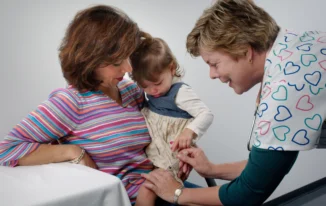3 Ways to Care For Your Child During Post-surgery Recovery
Did your little munchkin recently undergo surgery? Then, you might feel stressed, anxious, and sad as you see them in immense pain and discomfort.
On average, 3.9 million American children undergo surgical procedures every year. That means you are not alone in this situation. Millions of parents countrywide have felt what you are feeling right now.
Like these parents, you must also feel worried about after-surgery care and recovery at home. There are many ways to care for your child as they recover from surgery. For instance, you can physically groom them to avoid complications like infections or hemorrhages. You can also hire a nurse, assist in performing daily tasks, and feed them good-quality food.
In this blog, we will discuss such caring tips to help your child feel comfortable after surgery.

#1. Getting Help From Professionals
It can be challenging to care for your child if you need to go to the office daily or focus on working from home. In America, 97.4% of families have at least one working parent, whereas 65% have both employed parents. If you are a working parent, you may feel disheartened about leaving your child alone. But you can be stress-free by hiring a family nurse practitioner (FNP).
These registered nurses (RNs) are trained to offer primary or specialty care to patients of all ages. They can monitor, play with, and care for your child in your absence. Usually, FNPs charge USD 59 to USD 64 per hour.
Even then, you might be wondering whether your child will be in good hands if you leave them with FNPs. Well, the answer lies in the question- how to become an FNP. These nurses undergo stringent clinical training and multiple exams that help them offer the best care.
In the healthcare industry, this position is considered extremely sought-after and rewarding. That is because FNPs have to be compassionate, professional, and highly trained.
According to Carson-Newman University, becoming an FNP is a difficult task. Aspirants must go through multiple stages to gain this degree.
For instance, RNs must obtain a Bachelor of Science in Nursing (BSN) degree. After that, they must get a certification in Master of Science in Nursing with an FNP specialty (MSP-FNP). Once obtained, they can aim to pass the state-certified FNP certification examination.
After going through these stages, the nurse can finally have an FNP certification. Only then are they legally able to manage chronic health conditions, treat acute injuries, and conduct physical assessments. They can also educate you about your child’s health, disease prevention, and wellness.
#2. Helping Your Child Adjust to Normal Routine
Getting back to normal after surgery can be difficult. Being on medication could make them moody and lead to attention-seeking tantrums. Your child might also become more clingy. Furthermore, they can develop an increased need to play with their toys or stay with you while watching TV.
Your child will also be vulnerable to accidents during the recovery process. Hence, you must help them walk, take baths, or climb in bed. Try to follow the usual daily routine to make them feel normal and safe.
According to WebMD, the recovery process can slow down if the patient becomes too active or remains in bed without minimal exercise. That is why you must find a perfect balance between activity and rest. Encourage them to walk around the house and take a few naps daily in a peaceful ambiance.
However, the medications can disrupt your child’s sleeping habits and patterns. In most cases, the child might sleep more than usual or stay awake due to pain or discomfort. You must find ways to help them get plenty of rest and sleep. For that, you can limit strenuous play times and encourage relaxation.
Reports suggest that children can develop a fear of sleeping alone at night after surgery. Therefore, you should constantly reassure them about their safety and give them all the love they deserve.
#3. Focusing on Your Child’s Nutrition
Doctors believe that the body’s metabolism deteriorates after major surgery. Therefore, your child might vomit within the first 48 hours post-surgery if you give them solid food.
That is why you must maintain a strict diet in the first few weeks of the recovery process. Maintain a diet with a good supply of carbohydrates, antioxidants, and proteins to help rebuild damaged cells.
While recovering, your child will demand to eat their favorite food items. No matter how much you want them to feel better, you should avoid giving them comfort foods without consulting a doctor. Instead, you can choose food items like fruit juices, soups, boiled vegetables, crackers, and dietary supplements.
Usually, your child’s healthcare provider will recommend a liquid, no-chew, soft-textured, or regular diet based on the type of surgery. Therefore, you should stick to that diet to ensure enhanced recovery. Remember to encourage the intake of fluids to keep them hydrated.
The Bottom Line
Needless to say, taking care of your child after surgery is a serious task that requires 24×7 dedication and attention. To enhance their recovery process, you must follow the dietary limitations and care instructions shared.
Moreover, if you hire an FNP, they will oversee everything your child does throughout the day and assist with daily activities. This way, your little munchkin can recover quickly and regain their childlike glee.
